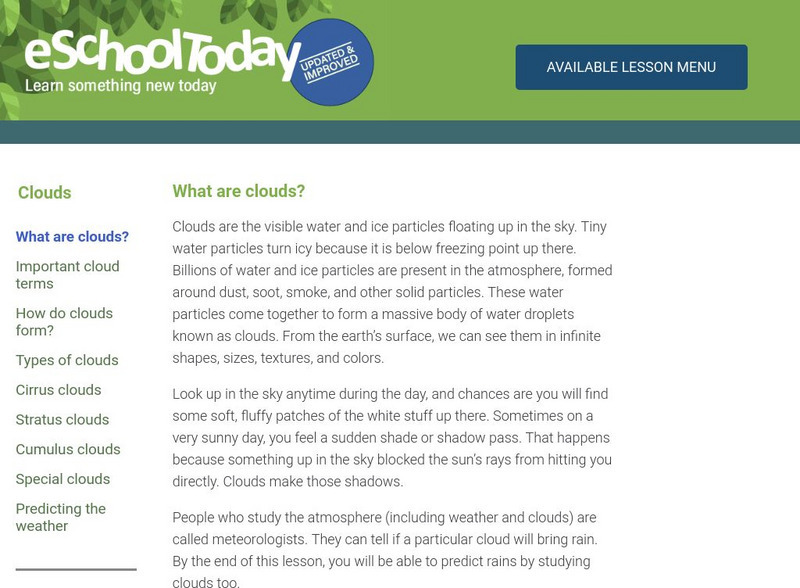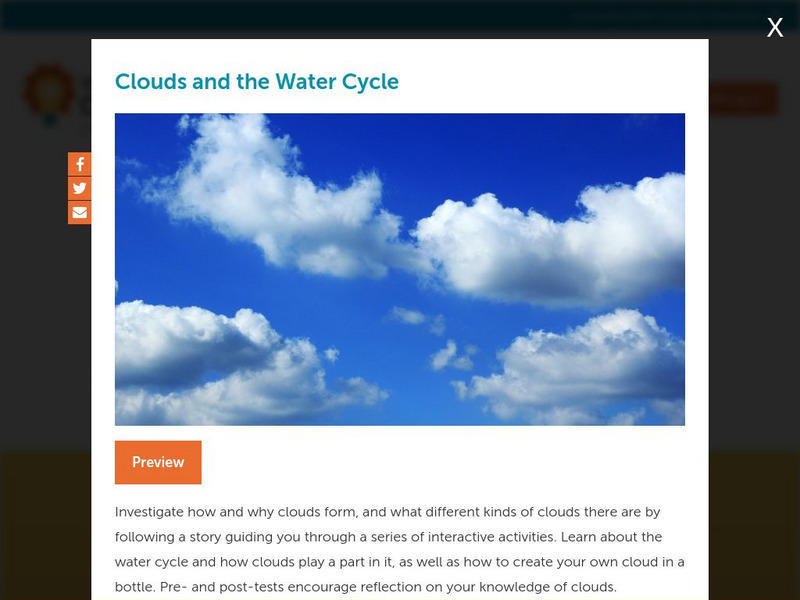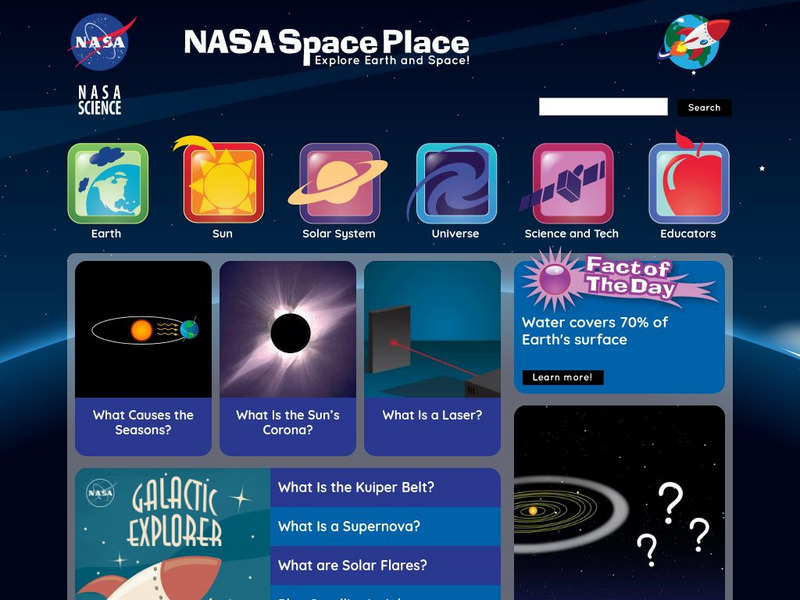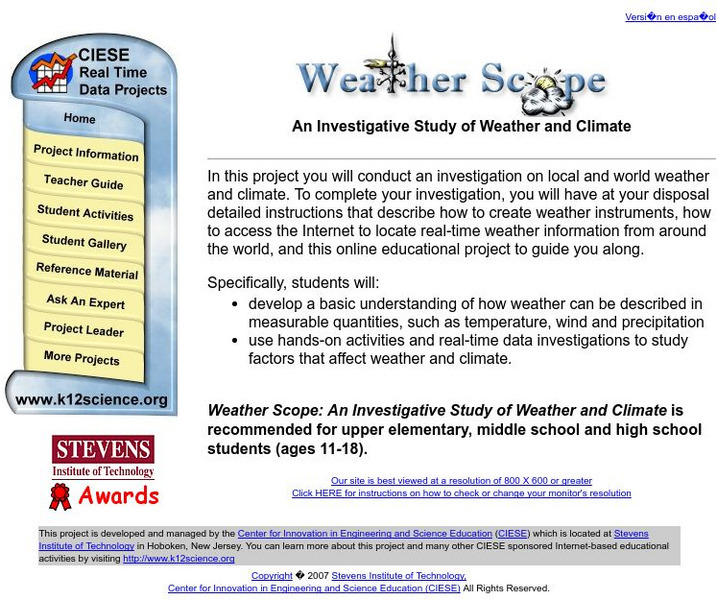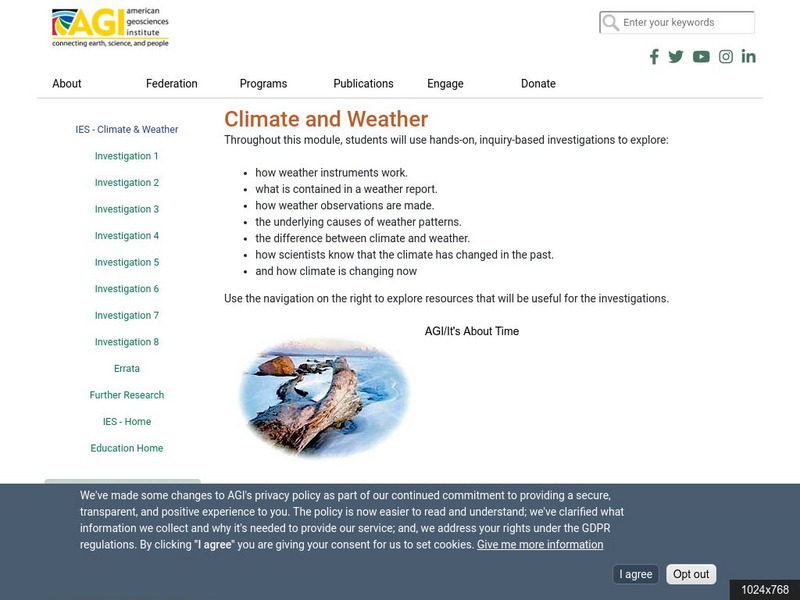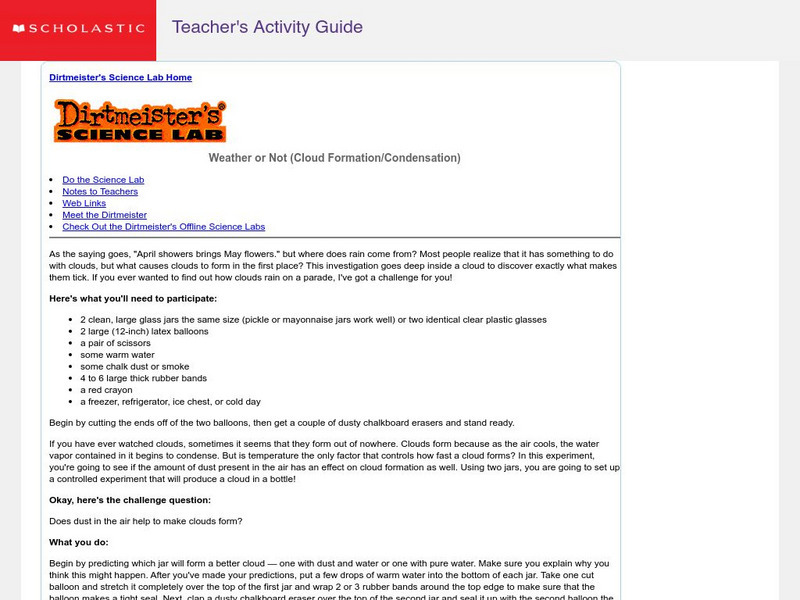Hi, what do you want to do?
Curated OER
Beginning Analogies 9
For this analogies worksheet, students read the word pairs and choose the answer that best expresses a relationship similar to the original pair.
Read Works
Read Works: The Whys of Weather Clouds
[Free Registration/Login Required] An informational text about clouds and how they are formed. A question sheet is available to help students build skills in reading comprehension.
Other
Weather 101: Cloud Formations
This Weather 101 site provides information to the boater about different cloud formations and what they mean to a boater.
Weather Wiz Kids
Weather Wiz Kids: Clouds
Meet the different kinds of clouds found in our atmosphere! Included are answers to why clouds are white, why they turn gray, what is fog, cloud chart, links to cloud lesson plans, and more!
Ducksters
Ducksters: Earth Science for Kids: Weather: Clouds
Kids learn about clouds including how they form, levels, fun facts, and types of clouds such as cirrus, cumulus, and stratus.
USA Today
Usa Today: Understanding Clouds and Fog
Learn about the different kinds of clouds, their location in the sky, how they form, their influence on the weather, and unusual cloud shapes.
NOAA
Noaa: National Weather Service: Jetstream: Clouds
Online school for weather presents much information about clouds. Discover how they form, the different types, their colors, and more. A review quiz and lesson plans are included for further enhancement of the topic.
eSchool Today
E School Today: Your Revision Notes on Clouds
Learn all about clouds, how they form, the different types, and how they can be used to predict the weather.
Globe
The Globe Program: Clouds Module
Activities give students the opportunity to describe the shape and appearance of cumulus clouds and learn the types of weather that are associated with them. They identify cloud types using cloud classification names and explore the...
Seeker
Seeker: Week of 3 10 14: Fingerprinting Clouds
Scientist have recently discovered that clouds possess far more unique traits than just their shapes. Read about the scientific discovery that at least some clouds contain biological particles that can be analyzed to show where the cloud...
Concord Consortium
Concord Consortium: Stem Resources: Beginning Clouds Unit
Explore how clouds are formed with the computer-based model in these interactive activities. Also learn about clouds part in the water cycle. Activity includes pre- and post-tests which can be saved and graded by the teacher.
OpenSciEd
Open Sci Ed: 6.3 Weather, Climate & Water Cycling
Why does a lot of hail, rain, or snow fall at some times and not others? This unit contains four separate lesson sets built around answering this question. In the first two lesson sets, students explain small-scale storms. In the third...
Other
Niwa: Climate and Weather
Want to learn more about the climate and weather? This webpage contains links to websites around the world concerned with providing information about climate and weather. Topics include ozone, greenhouse gases, global warming, tornadoes,...
NASA
Ucar Center for Science Education: Web Weather for Kids
This website provides information, lessons and activities regarding clouds, tornadoes, thunderstorms, hurricanes and winter storms.
Utah Education Network
Uen: Cloud, Rain, and Fog
During these three days of lessons, 2nd graders will learn about weather from the nonfiction text by asking questions, and focusing on the text features of the book.
NASA
Nasa: Introduction to Clouds [Pdf]
NASA is interested in clouds because they are an integral part of the water cycle, and because they are a controlling factor in the energy budget of the Earth. This chart provides a basic introduction to the identification of clouds. The...
Center for Innovation in Engineering and Science Education, Stevens Institute of Technology
Ciese Real Time Data Projects: Weather Scope: A Study of Weather and Climate
Use real-time data to study factors that affect weather and climate, create weather instruments, and share data with learners around the world.
American Geosciences Institute
American Geosciences Institute: Climate and Weather
Eight hands-on lessons module in which students explore climate and weather. Inquiry-based investigations include observing weather, weather reporting, weather maps, weather satellites, causes of weather, and climate change.
NOAA
Noaa: National Weather Service: Jet Stream: Jet Stream Learning Lessons
Here's a comprehensive list of lesson plans offered by the National Weather Service covering the gamut of weather topics from the atmosphere to synoptic meterology. The plans include objectives, supplies necessary for the lesson, teacher...
University Corporation for Atmospheric Research
Ucar: Clouds, Weather, and Climate Teaching Box
This Teaching Box combines hands-on activities, data analysis, and discussion that help high school students consider how weather can affect cloud types and how cloud types can affect climate.
Dan Satterfield
Dan's Wild Weather Page: Clouds
Find out all about clouds and how they are formed at this site from Dan's Wild Weather Page. Nice photographs of different types of clouds enrich the site.
PBS
Pbs Learning Media: A Look at Weather Factors: Interactive Lesson
Students learn about four factors that describe different types of weather -- temperature, wind, precipitation, and sunlight and clouds -- as they explore various weather conditions and find evidence that describes each type of weather...
Scholastic
Scholastic: Dirtmeister's Science Lab: Weather or Not
Simple experiments for exploring clouds and cloud formation. You'll find out whether dust in the air helps cloud formation and discuss how dust helps meteorologists make weather predictions.
Other popular searches
- Weather Clouds Experiment
- Weather Clouds Chart
- Cumulus Clouds Weather
- Clouds and Weather
- Weather Clouds Diorama
- Environment Weather Clouds
- Weather Clouds Winter
- Weather Clouds Experiiment
- Clouds Predict Weather
- Science Weather Clouds
- Clouds Weather
- Clouds and Weather Patterns












